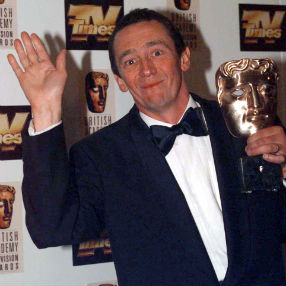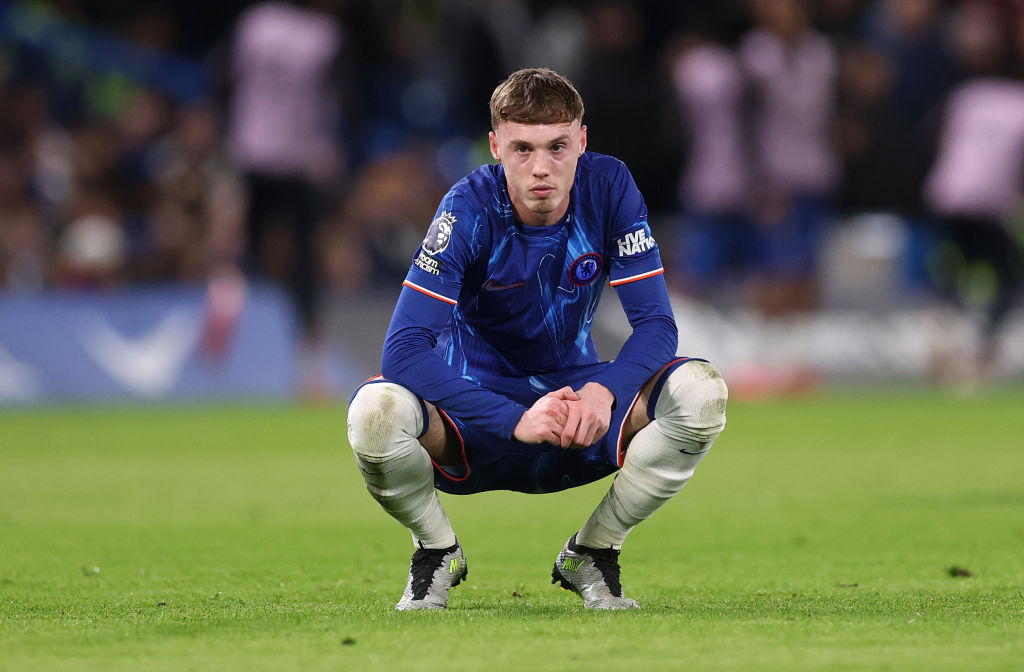Paul Whitehouse: Sing When You're Winning
"My wife thinks Steve Bould is attractive in an 'I will come and bite your neck in the night' type of way"

Comedian and character actor Paul Whitehouse talks to FourFourTwo about his love of football and particularly Spurs, back in February 2000.
Paul Whitehouse is taking morning tea in the study of an exclusive gentleman’s club. It is the last place you would expect to find a man who has made his name playing comedy cockney geezers, but he is oddly comfortable in an environment of burnished leather and polished walnut, where the only sound is the deferential cough of the waiter bringing condiments on a silver salver. In these surroundings and with his dour demeanour he might be a city gent from an EM Forster novel – haughty, revered, apt to take offence at unseemly slurping from the saucer. Until he opens his mouth. And the voice of Ron Manager comes out.
"Marvellous, isn’t it? Small boys, jumpers for goalposts, enduring image, rolling the ball in dog muck and getting your friends to head it." He comes out of character with a different smile and darts a quick glance over to his PR people. They are reclining on a laughably opulent leather chaise longue and he is checking to see if they are laughing. Whitehouse is on the thin and wiry side, and gets more animated as he hops in and out of his Fast Show characters, which is something he does often.
The quick character changing that is Fast Show trademark is not something that Whitehouse finds particularly difficult. Since we are here to discuss the Fast Football video, he alternates between Paul Whitehouse and Ron Manager with such speed that you are not sure which one you are talking to. "Ron is part Alec Stock," he says, referring to the itinerant former Orient, Yeovil, Luton and Roma manager, "and a bloke who I used to work with on Hackney Council called Danny Wiseman. I suppose there’s a bit of old-style punditry in there as well – you know the referee with his flag, hmmm? Did he fight in the Second World War?"
He visibly enjoys the reaction his impromptu one-man show elicits. It is hard to match the gales of laughter from the PRs, but he seems pleased enough to be told that Ron’s half-witted asides have entered national lexicon.
"I remember seeing, out of nowhere, references to jumpers and goalposts and small boys which I was really pleased about," he says. "When I first did Ron on the telly, I didn’t get it right and I could see it wasn’t really as funny as it should have been. I struggled on with it for a while, and what came out of it was a good relationship with Simon Day’s character and Mark’s, so in the end we came to enjoy doing the characters with an audience."
Ron Manager was one of the characters Whitehouse had already offered to Harry Enfield when they were both working on Harry Enfield’s Television Programme. They first met after Whitehouse had left Hackney Council and was working as a plasterer, a job that gave him some material for Stavros, their first comic collaboration. "I’d just be mucking around down the pub, and he’d say, 'That’s a funny line. Can I have that?' So he encouraged me to write, and when he started on the telly I said, 'Well, if you’re gonna do this character, I’d like to write it for you.’" It gave Whitehouse the confidence, in his own parlance, to ‘hang up me trowel’ to start writing full-time, and eventually to push for his own show.
Get FourFourTwo Newsletter
The best features, fun and footballing quizzes, straight to your inbox every week.
The decision to break away is well documented, and Whitehouse runs through the story with the polished ease of somebody who has done it 12 times this morning for TV, radio and a handful of other magazines. As with The Fast Show, he cuts to his characters to stop you from thinking that Paul Whitehouse just might be a bit, well you know, serious sometimes, and also so he can say things that Paul Whitehouse would not get away with.
He freely admits that is why he enjoys Ron Manager. "You can have your cake and eat it. Simon and Mark [who plays Ron’s fellow pundits] could slag off someone like Ruddock, and Ron can come back with, 'An old-fashioned British slope-headed Neanderthal: there’s always a place for one of those in the midfield, isn’t there?'" It is a technique he carries over into the interview – a game to challenge your outrage threshold.
So when the subject of his decision to strike out on his own comes up, he says he "kicked Harry in the bollocks and told him to f**k off" as a nod to people suggesting a creative rift, and laughs quickly. But you guess that the real reason behind the joke is that he’d be mortified if anyone accused him of being ambitious – "Harry had the drive and ambition I never had. I wouldn’t have done anything with it," he insists.
It comes as no surprise that Whitehouse, the ex-plasterer from Enfield, supports Spurs. Unlike the other celebrity bandwagon jumpers, he readily admits he is a lapsed fan.
"To tell you the truth," he says, "I haven’t really been that much over the past four years. I was at Wembley for the Worthington Cup final, though." And, oddly for a Spurs supporter, the first game he remembers was at Highbury. "I was with my Dad, who was really into football, and his mate who was an Arsenal supporter. It was a European game, and they won something like 7-1. It was great, even though it was Arsenal – you know, the green pitch and things."
He is not quite as clear on his first game at White Hart Lane, other than the fact that "Gilzean scored and there were loads of really big skins wandering about – even in 1971." Still, there was no question that he had been seduced by his first glimpse of the Highbury turf. "I was brought up in Enfield, and this is Tottenham territory," he says.
Sadly, it is a concept that the younger members of the Whitehouse family have difficulty in grasping. "My two kids are very much into Arsenal," he says, grimacing. "Well, they’re young girls, and I think they realise that at their school it’s all about Arsenal and everyone they know is all Arsenal." It’s only a marginally less incongruous idea than the young Paul Whitehouse aspiring to be diminutive midfield falsetto Alan Ball.
"I liked watching Alan Ball," he says with the mix of confusion and suggestion of a man who has found a long-lost picture of himself wearing brown crimplene slacks. "Midfield dynamo. I suppose it sounded good. Eeeeeeeeeeee!" he squeaks abruptly, attempting an impersonation of the Pompey manager. Given time to reflect, he decides that Glenn Hoddle probably makes a more acceptable hero, and lapses into Ron Manager again. "Always had time, make a little bit of space, look up, bag. And you know he could put it on a postage stamp from 40 yards. Hmm?"
Another player he nominates for his dream team is Dennis Bergkamp, although it is hard to tell if this isn't because it leads nicely into a Mark Lawrenson impression. "You know, you’ve got to run the edge of the boxes, turn, two sugars, top corner. And they’re saying you can’t playing Bergkamp in the team, but you know I would every time."
George Graham also wins the Whitehouse seal of approval. "He is not going to be intimidated by Alan Sugar, or even the hostility of the Tottenham fans. I think he is slightly more cavalier than he ever was at Arsenal. By the way, my wife thinks Steve Bould is actually quite good looking. I said to her, 'I don’t think he’s a hunk,' but she said that he’s attractive in an 'I-will-come-and-bite-your-neck type of way.' In the night."
Ron Manager gets the last word. Pondering what Ron would make of the current Spurs team, Whitehouse says, "He’d think they were cheating, diving, nasty foreign scum. But he’d rather like the English boys. Like that nice Steven Iversen."
After the interview is over, a more earnest and relaxed Whitehouse comes over for a brief chat while the photographer sets up his gear. It makes you think that Whitehouse is a bit more complicated than he would like to let on. Maybe the Paul Whitehouse of yore does not co-exist too happily with the Paul Whitehouse who gives intervies in gentlemen’s clubs, and who doesn’t not get to White Hart Lane as much as he would like.
There is one big sign he has not changed that much. The waiter brings Whitehouse’s meal, a burger presented on finest bone china with a swirl of lettuce. He pauses before tucking in with silverware that would place royalty. "Want a chip?" he asks. "Just the one, mind. I’m starving." And he laughs, quickly.
Interview: Richard Pendleton. From the February 2000 issue of FourFourTwo. Subscribe!
Nick Moore is a freelance journalist based on the Isle of Skye, Scotland. He wrote his first FourFourTwo feature in 2001 about Gerard Houllier's cup-treble-winning Liverpool side, and has continued to ink his witty words for the mag ever since. Nick has produced FFT's 'Ask A Silly Question' interview for 16 years, once getting Peter Crouch to confess that he dreams about being a dwarf.

